Books by Mary Jane Curry
Educating Refugee Background Students: Critical Issues and Dynamic Contexts, 2018
This collection of empirical work offers an in-depth exploration of key issues in the education o... more This collection of empirical work offers an in-depth exploration of key issues in the education of adolescents and adults with refugee backgrounds, residing in North America, Australia and Europe. The studies foreground student goals, experiences, and voices, and reflect the assets that refugee-background students bring to schools and society.

anguage, Literacy, and Learning in STEM Education brings together a range of applied linguistic r... more anguage, Literacy, and Learning in STEM Education brings together a range of applied linguistic researchers and projects that address the interface among language studies, science, engineering, and education. The book is premised on the concept that science
is of central importance in the twenty-first century and that linguistic knowledge can contribute to the description, understanding, education, and practice of science, technology, engineering, and mathematics. The book introduces various linguistic methodologies
and discusses ways in which these have been used to promote STEM education. It offers a first collection of such studies and a wide-ranging introduction to ways in which applied linguistics can serve as a resource for questions, projects, and issues situated within the fields of STEM. The book should be of interest to applied linguists working in STEM,
as well as STEM professionals working in education and administrative or funding bodies interested in supporting and enhancing educational practices in the sciences.
[Language Studies, Science and Engineering, ] . xvi, pp.
 978 90 272 5750 5 - 978 90 272 7011 5

Academic Writing in a Global Context examines the impact of the growing dominance of English on a... more Academic Writing in a Global Context examines the impact of the growing dominance of English on academic writing for
publication globally. The authors explore the ways in which the
global status attributed to English is impacting on the lives and
practices of multilingual scholars working in contexts where
English is not the official language of communication. The book
throws into relief the politics surrounding academic publishing.
Drawing on an eight year ‘text-ethnographic’ study of the
experiences of fifty scholars working in Europe, this book
discusses these questions at both a macro and micro levelthrough discussions of knowledge evaluation systems on all levels, and analysis of the progress of a text towards publication.
In addition to this, case studies of individual scholars in their
local institutions and countries are used to illustrate experiences of using English in the academic world.
Academic Writing in a Global Context addresses the issue of the pressure on academics worldwide to produce their work in
English in scholarly publishing, and why the growth of the use of academic English matters.
Papers by Mary Jane Curry
Teaching and Researching Writing, 2015
For guidance on citations see FAQs.
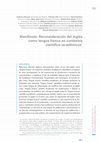
Revista Argentina de Investigación Educativa, 2023
Buscamos discutir algunos presupuestos sobre el uso del inglés como “lengua franca” en contextos ... more Buscamos discutir algunos presupuestos sobre el uso del inglés como “lengua franca” en contextos científico-académicos, identificar el impacto de estos presupuestos en las trayectorias de producción y recepción de conocimientos, y legitimar el uso de múltiples lenguas para el intercambio académico transnacional. Proponemos diez principios: el uso del inglés como “lengua franca” científico-académica no siempre promueve la inclusión; una supuesta “lengua franca” científico-académica puede actuar como lengua de dominación; las políticas que posicionan al inglés como “lengua franca” pueden desalentar las traducciones y limitar la participación; las políticas que colocan al inglés como la “lengua franca” científico-académica contemporánea pueden sugerir que el conocimiento producido en inglés es el único que existe; la imposición del inglés como presunta “lengua franca” científico-académica es una expresión de la distribución desigual de la producción y recepción de conocimiento; las lenguas y variedades actúan como poderosos recursos para la producción de conocimiento; la elección de una lengua de publicación o presentación es un derecho sociolingüístico; la elección de una lengua de publicación o presentación es un acto político; los organizadores de congresos deberían tener derecho a fomentar la(s) lengua(s) de su preferencia; los organizadores y participantes de congresos deberían ser creativos y estar atentos a la inclusión de audiencias lo más diversas posible.
Languages, 2019
Educators, scholars and practitioners whose work intersects with refugee learners’ lives and scho... more Educators, scholars and practitioners whose work intersects with refugee learners’ lives and schooling are familiar with the many strengths and challenges these learners bring to and encounter in classrooms and communities every day [...]
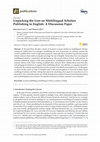
Publications, 2019
In the past three decades, a body of research on issues related to multilingual scholars writing ... more In the past three decades, a body of research on issues related to multilingual scholars writing for publication has emerged, paralleling the rise of pressures on scholars around the world to publish their work in high-status journals, especially those included in particular journal citation indexes; these indexes typically privilege the use of English. Researchers have investigated multilingual scholars’ experiences and perspectives, the social contexts of their work, policies on research publishing, aspects of the texts produced by multilingual scholars, the kinds of people scholars interact with while working to publish their research, their collaborations and networks, and pedagogical initiatives to support their publishing efforts. Nevertheless, as ongoing research is conducted, the existing research base has not always been consulted in meaningful ways. In this paper, we draw on the notion of ‘lore’ to identify some of the preconceptions or received wisdom about multilingual s...
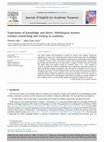
Journal of English for Academic Purposes, 2018
This paper explores the significance of gender in research and academic writing for publication. ... more This paper explores the significance of gender in research and academic writing for publication. It reports on a gender-focused, interview-based study with 10 multilingual women scholars, set within a longitudinal research project in which they have participated for between 11 and 14 years. The scholars work in two disciplinary fields, education and psychology, and come from four national contexts: Hungary, Slovakia, Spain and Portugal. The paper argues that gender remains an 'occluded' (after Swales, 1996) category in research on academic writing for publication but is implicated in practices around academic knowledge making in important ways. Key themes emerging from the data are discussed: the passions driving intellectual work; academic inscription practices; networks of collaboration; being a carer; academic service work; the body in academia. The value of exploring women scholars' perspectives and practices through the lens of trajectory is underscored, offering as it does glimpses of how they enact agency at specific moments of their academic lives, in an increasingly rigidly governed and evaluated social space.
International Higher Education, 2015
AILA Review, 2015
Drawing on 95 text histories from a longitudinal project on writing for publication in 4 national... more Drawing on 95 text histories from a longitudinal project on writing for publication in 4 national contexts, this article analyses the language ideologies enacted in referees’ and editors’ comments on articles submitted for publication in English-medium ‘international’ journals. It considers how orientations to ‘English’, ‘language’ and ‘language work’ are enacted in practices of reviewer uptake and the consequences of such practices for knowledge production, evaluation and circulation. In exploring evaluation practices, the article problematizes three foundational categories in applied linguistics: (1) The treating of English as a single stable semiotic resource over which the ‘native’ speaker is attributed a privileged evaluative position; (2) The overriding transparency approach to language and communication; (3) The focus on production as distinct from uptake.
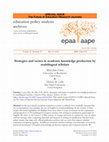
Education Policy Analysis Archives, 2014
In the past decade, academic evaluation systems worldwide have markedly increased the use of mech... more In the past decade, academic evaluation systems worldwide have markedly increased the use of mechanisms that privilege the use of English in journal publishing. In the context of these trends, this article highlights our findings from more than 12 years of research on the experiences and perspectives of 50 multilingual European scholars with writing for publication, particularly in English. We draw on de Certeau’s (1984) notions of strategies and tactics to explore key ways in which scholars manage often-competing demands and interests in writing for publication. Scholars both adopt strategies that align with official publication policies and use tactics that support scholars’ sometimes competing agendas. At different moments scholars embrace, accommodate, or resist the perceived dominance of English in knowledge production regimes and evaluation systems. We conclude by summarizing the value of drawing on the notions of strategy and tactics in an era of increasing debates over evalu...

TESOL Quarterly, 2004
This article examines how multilingual scholars who work outside English-speaking countries negot... more This article examines how multilingual scholars who work outside English-speaking countries negotiate the demand to publish in English alongside their broader academic and publishing interests. Based on our ethnographic study of the academic writing and publishing practices of 16 psychology scholars in Hungary, Slovakia, and Spain, we characterize the range of communities for whom the scholars are writing, drawing on notions of discourse community, community of practice, and speech community. We discuss the differential value attached to publications for different communities and how such value is sustained through the rewards systems in which scholars work. We offer brief profiles of three scholars from the study to illustrate how they negotiate academic and professional interests. We explain implications of the findings to TESOL, particularly for curriculum and pedagogy in English for academic purposes.
English for Specific Purposes, 2010

Revista Canaria de Estudios Ingleses, 2006
In this paper we reexamine the emphasis on individual expertise, through the exploration of two c... more In this paper we reexamine the emphasis on individual expertise, through the exploration of two case studies of scholarly academic writing production in two contexts-Spain and Hungary. We argue that the dominant emphasis in ELT 1 on competence as individual knowledge or expertise may be misguided in a number of ways; it does not reflect the real life text production practices of scholars; and it underplays the importance of the opportunities and resources afforded by the material conditions under which scholars work. We call for a shift in emphasis away from the individual producer, towards the relations between the individual, his/her network, and the resources that can be mobilised for text production. Individual knowledge of, or "competence" in, English thus becomes one element of many which lead to the successful production of English-medium academic texts. We end by briefly discussing some implications for teaching.
Language Policy, 2013
The rise of English as the presumed global medium of scholarly publishing has resulted in both ob... more The rise of English as the presumed global medium of scholarly publishing has resulted in both obvious and less obvious consequences for individual scholars, journals, institutions of higher education and knowledge production more broadly (Lillis and Curry 2010). A body of research emerging in the past 10 to 15 years has explored these consequences mainly in terms of how individual multilingual scholars working outside of Anglophone contexts respond to the growing pressure to publish in high-status, English-medium journals. Researchers have used qualitative/ethnographic methodologies (e.g.
Language Policy, 2013
The rise of English as the presumed global medium of scholarly publishing has resulted in both ob... more The rise of English as the presumed global medium of scholarly publishing has resulted in both obvious and less obvious consequences for individual scholars, journals, institutions of higher education and knowledge production more broadly (Lillis and Curry 2010). A body of research emerging in the past 10 to 15 years has explored these consequences mainly in terms of how individual multilingual scholars working outside of Anglophone contexts respond to the growing pressure to publish in high-status, English-medium journals. Researchers have used qualitative/ethnographic methodologies (e.g.


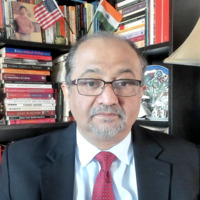

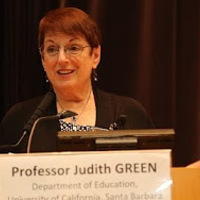






Uploads
Books by Mary Jane Curry
is of central importance in the twenty-first century and that linguistic knowledge can contribute to the description, understanding, education, and practice of science, technology, engineering, and mathematics. The book introduces various linguistic methodologies
and discusses ways in which these have been used to promote STEM education. It offers a first collection of such studies and a wide-ranging introduction to ways in which applied linguistics can serve as a resource for questions, projects, and issues situated within the fields of STEM. The book should be of interest to applied linguists working in STEM,
as well as STEM professionals working in education and administrative or funding bodies interested in supporting and enhancing educational practices in the sciences.
[Language Studies, Science and Engineering, ] . xvi, pp.
 978 90 272 5750 5 - 978 90 272 7011 5
publication globally. The authors explore the ways in which the
global status attributed to English is impacting on the lives and
practices of multilingual scholars working in contexts where
English is not the official language of communication. The book
throws into relief the politics surrounding academic publishing.
Drawing on an eight year ‘text-ethnographic’ study of the
experiences of fifty scholars working in Europe, this book
discusses these questions at both a macro and micro levelthrough discussions of knowledge evaluation systems on all levels, and analysis of the progress of a text towards publication.
In addition to this, case studies of individual scholars in their
local institutions and countries are used to illustrate experiences of using English in the academic world.
Academic Writing in a Global Context addresses the issue of the pressure on academics worldwide to produce their work in
English in scholarly publishing, and why the growth of the use of academic English matters.
Papers by Mary Jane Curry
is of central importance in the twenty-first century and that linguistic knowledge can contribute to the description, understanding, education, and practice of science, technology, engineering, and mathematics. The book introduces various linguistic methodologies
and discusses ways in which these have been used to promote STEM education. It offers a first collection of such studies and a wide-ranging introduction to ways in which applied linguistics can serve as a resource for questions, projects, and issues situated within the fields of STEM. The book should be of interest to applied linguists working in STEM,
as well as STEM professionals working in education and administrative or funding bodies interested in supporting and enhancing educational practices in the sciences.
[Language Studies, Science and Engineering, ] . xvi, pp.
 978 90 272 5750 5 - 978 90 272 7011 5
publication globally. The authors explore the ways in which the
global status attributed to English is impacting on the lives and
practices of multilingual scholars working in contexts where
English is not the official language of communication. The book
throws into relief the politics surrounding academic publishing.
Drawing on an eight year ‘text-ethnographic’ study of the
experiences of fifty scholars working in Europe, this book
discusses these questions at both a macro and micro levelthrough discussions of knowledge evaluation systems on all levels, and analysis of the progress of a text towards publication.
In addition to this, case studies of individual scholars in their
local institutions and countries are used to illustrate experiences of using English in the academic world.
Academic Writing in a Global Context addresses the issue of the pressure on academics worldwide to produce their work in
English in scholarly publishing, and why the growth of the use of academic English matters.
First chapter is available here:
https://urldefense.proofpoint.com/v2/url?u=http-3A__www.multilingual-2Dmatters.com_pdf_samples_Global-2DAcademic-2DPublishing-2DCh1.pdf&d=DwMGaQ&c=kbmfwr1Yojg42sGEpaQh5ofMHBeTl9EI2eaqQZhHbOU&r=_rMj7-Pgoc9IWqUnTVAZ6aLZ1r8V9PaRLjSW-DQVx4E&m=u8vBoR7Vo6lDSr7MVIwVOZsVDLbGtKvdIDJ8r45P9m0&s=4MNVMmzbgme8786q6_gPbjeaVC4JuKYUAQ-oNkCPQHc&e=